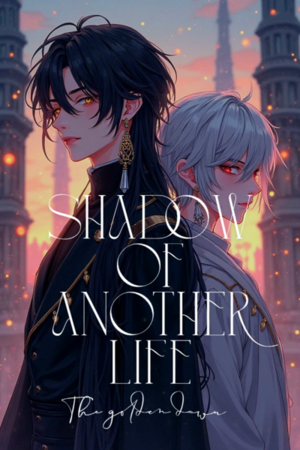Chapter 49:
Haruto Nishikawa
Shadows of another life: The golden dawn
Real Caelith—on Earth, he was known as Haruto Nishikawa—had once lived a life filled with words. Not just any words, but words that made people pause, words that lingered in the chest long after the page had ended.
His first real breakthrough had been a short story called Step into the Light, which, unexpectedly, had moved millions. It was a small story, quiet in its tone, yet brimming with hope and subtlety.
Readers would write to him, thanking him for giving voice to feelings they could never express themselves. Letters arrived in printed form, in emails, in forum posts across the internet; he even received fan art, sketches of characters he had barely fleshed out in the original story. Haruto could never have anticipated the way a single narrative could ripple so far, could leave such an impression.
And yet, for all its success, it had not spoiled him. Haruto remained disciplined, sitting at his desk day after day, scribbling, typing, revising. Stories kept forming, always with that same quiet heartbeat, an insistence to give humanity in words, even when the world outside felt indifferent.
Over the years, his name grew familiar in literary circles, then in mainstream pop culture. He became known for his ability to craft compelling minor characters, those who often would be overlooked, who seemed small on the page but bore enormous emotional weight.
The main characters often carried the plot, yes, but the side characters were his secret joy. He knew which characters would never survive the narrative arcs and yet, perversely, he cared more for them than for the heroes.
And then came the story that would change him—not because it was popular, but because it demanded that he confront something far heavier than fame or acclaim.
The story was a long-form novel, one that he poured months, years into, carefully balancing world-building, magic systems, and character arcs. The main character was Arian Runerth, bold and charismatic, a hero destined to shape the world he inhabited. But as he wrote, Haruto found himself captivated by another figure, a side character whose quiet strength and subtle compassion with his kind personality made him the true heart of the story. Lucien. Lucien Veynar.
Lucien was unassuming in the narrative. He was not destined to wield armies or overthrow tyrants. Yet, in the spaces between scenes, he carried the weight of the world in a different way: the moments of silent courage, the small gestures that revealed a character’s true soul.
Haruto often caught himself pausing while writing Lucien’s lines, letting the dialogue stretch longer than it needed to, letting the character breathe and exist beyond the confines of the plot.
And then came the chapter he dreaded most.
The chapter where Lucien had to die. Or more accurately, where he had to sacrifice himself for the survival of others. Haruto knew the story demanded it. He knew the structure of the plot, the inevitability of narrative consequence.
And yet, when he wrote the words, it felt like a blade sliding through his own heart. Every sentence carried a weight he could barely endure. Each paragraph was a careful negotiation between duty to the story and desire to preserve the character he loved.
When he finished, he stared at the screen. The words glared back at him in stark white and black. He had done what was required. But the act of completing the chapter left him hollow. There was no joy in knowing it was perfect. There was no comfort in the knowledge that it would be celebrated. He simply sat there, drained, exhausted in every fiber of his being.
After publishing the chapter, the accolades poured in as expected. Readers called it a masterpiece. Critics praised the emotional resonance.
Haruto received messages from fans who cried over Lucien’s sacrifice, who said they would never forget him. And he… he could only close his laptop, slide to the edge of his chair, and sit in a silence that was deafening. The grief was all his own, not shared with anyone, not softened by the joy it brought to others.
The days stretched into weeks. Haruto could not write. His imagination, once a roaring river, had been dammed by exhaustion and guilt. He could think only of Lucien, the fictional side character he had grown to love more than the main protagonist, and the inevitability of his death.
The act of creating had become a torment. He found himself reading the chapter repeatedly, each time hoping, irrationally, that the words might shift if he looked hard enough.
One night, unable to sleep, he reopened the chapter. The room was silent except for the soft hum of his computer. He traced the lines with his finger as he read, absorbing the words as if they could offer some small solace. And yet, with every sentence, the weight of Lucien’s fate pressed down on him anew. He felt dizzy, nauseated, his vision blurring at the edges.
“I could… maybe…” he whispered to himself, a hesitant murmur in the empty room. “Maybe I could rewrite this. Maybe I don’t have to let him die…”
The thought was so absurd it made him laugh quietly, a tremulous, broken sound. A dream, surely. That was all it could be. His exhaustion had twisted his mind. The idea that a fictional world could bend to his will outside of the page was ludicrous. And yet the idea persisted, shimmering in his mind like a candle flame he could not extinguish.
His eyelids grew heavy. The room tilted. Words on the screen swam. And sleep claimed him, dragging him down into a darkness that felt thicker than any night he had known.
When he awoke—or rather, when his senses returned enough to notice—the first thing he saw was not his study, not the comforting clutter of manuscripts, not the pale glow of his desk lamp. It was a message, hovering in the air like frost on a winter windowpane.
> If Haruto Nishikawa wishes to save his favorite character, he may.
Acceptance is required.
This action comes with cost and consequence.
Haruto froze, staring at the floating words. His heart beat so rapidly it was almost painful. He pinched himself, rubbed his eyes, convinced he was dreaming, hallucinating from exhaustion. He muttered, “This… this isn’t real. This is impossible.”
And yet, the words persisted. The choice was clear, tangible, urgent. Save Lucien. The character he loved, whose fictional sacrifice had broken him from the moment he typed it, could live—but only if he, Haruto, committed to it.
He thought of the long nights of writing, the endless drafts, the careful plotting, the obsession with every word. He thought of Lucien’s quiet courage, the way he had come to matter more than any hero in the story.
He thought of Arian, the main character, and the cruel inevitability of narrative structure. And he realized, with a clarity that startled him, that he could not ignore this chance, however impossible it seemed.
“Yes,” he whispered.
The word was almost swallowed by the darkness as his eyelids shut once more. And in that instant, the boundary between dream and reality, between creator and creation, began to dissolve. He felt the pull of the story, the threads of his own narrative bending toward him, tugging him into a world he had once controlled with ink and imagination.
And then the darkness enveloped him completely, a waiting void filled with possibility.
Somewhere, in the murky space between sleep and consciousness, the first shifts of the story began. The world he had written, the cycles he had endured, the patterns he had known—all of it began to bend, not vanish, not collapse, but become something new.
Lucien’s fate was no longer fixed. The sacrifice he had written, the death that had been inevitable, could be changed. And Haruto Nishikawa—real Caelith—aka me—had chosen to act.
The threads of the story waited.
And somewhere deep in that waiting, Haruto Nishikawa felt the smallest stirrings of hope, the faintest spark of possibility, and a heartbeat of fear.
He was about to step back into his own story.
I will save you, I will. Wait for me Lucien...




Please sign in to leave a comment.